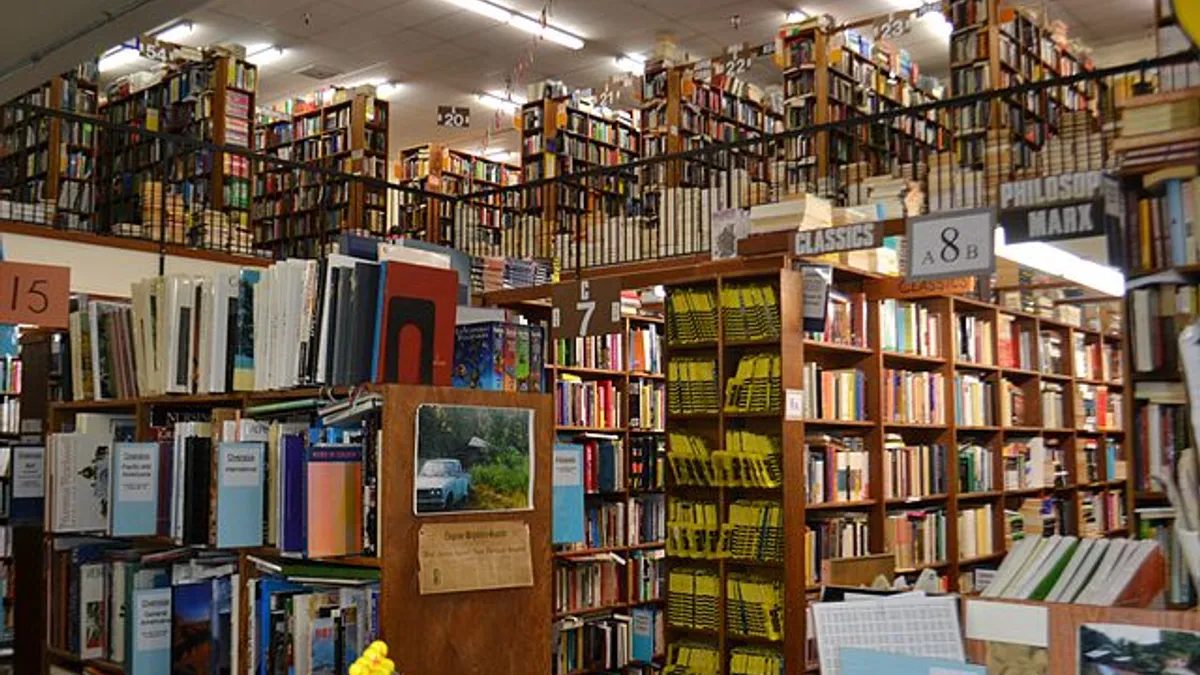Aside from a short reprieve, the holidays provide an opportune time for educators at all levels of K-12 and higher ed to catch up on the latest trends and issues.
The past year has seen a number of books tackle topics ranging from standardized testing and the shift away from an industrial education model to vocational learning and well-intentioned efforts to "fix" a struggling school system cross the Education Dive desk. With a little something for everyone, here's a rundown of six books to keep on your radar.
The Test
Author: Anya Kamenetz
Released last December, "The Test: Why Our Schools are Obsessed with Standardized Testing–But You Don't Have to Be" is arguably the definitive text of the movement against standardized testing. Early in the book, Kamenetz, the lead education blogger for NPR, lays out 10 reasons why standardized testing is a bad idea. Among them: That the U.S. is testing the wrong things and spending too much to do so. Adeptly covering the history, politics, and technology of standardized testing, and providing substantial research to back up its assertions, this "Test" should be taken by those on both sides of the debate.
The Prize
Author: Dale Russakoff
In "The Prize: Who's in Charge of America's Schools," veteran Washington Post reporter Dale Russakoff examines efforts to reform the struggling schools of Newark, NJ, by Facebook founder Mark Zuckerberg, Gov. Chris Christie, Sen. Cory Booker (then the city's mayor), Supt. Cami Anderson, and others following Zuckerberg's $100 million donation to the district. The city is one of the nation's poorest, and Russakoff's portrait of the attempt at reform goes from the classroom level, where the effects of poverty and violence are most visible, to the political and philanthropic stage seen by most onlookers. In her first book, Russakoff succeeds in painting a vivid portrait of how the best-laid plans can often go awry — especially when dealing in the tangled politics of the modern education landscape.
The Purposeful Graduate
Author: Tim Clydesdale
Unless you've been living under a rock, you're probably very much aware that career and vocational education is en vogue. Some have argued that the intense focus on career training and pumping out students in high-wage fields, however, is happening to the detriment of one of higher ed's larger purposes: exploration and self-discovery. It's an issue that Tim Clydesdale broaches in "The Purposeful Graduate: Why Colleges Must Talk to Students about Vocation," arguing that these factors don't have to be exclusive of one another if institutions are willing to help students find the answers to the big questions of who they are and what their vocational calling is — and he backs up his claims with research into a number of successful programs at liberal arts colleges.
Putting Education to Work
Author: Megan Sweas
The Cristo Rey network of Catholic private schools has made a name with its work-study program, not to mention a values-based approach to education, gaining high-profile supporters like Melinda Gates, Colin Powell, and Jeb Bush. In "Putting Education to Work: How Cristo Rey High Schools are Transforming Urban Education," freelance journalist Megan Sweas profiles the 28 schools' impact on their underprivileged students, providing structure and rigid college-prep curriculum alongside opportunities for work experience. This is the best place to get a leg up on the model, as it wouldn't be shocking to see similar approaches increasingly adopted by the public sector.
Creative Schools
Author: Sir Ken Robinson
The man behind the most-viewed TED Talk, Sir Ken Robinson is also one of the foremost minds when it comes to creative thinking in education. He continues questioning if the right values are being applied in classroom innovation with his latest book, "Creative Schools: The Grassroots Revolution That's Transforming Education," positing that the end is nigh for the industrial education system of the last century. While he's not the only person in the field who sees the need for a new way, he makes plenty of observations and recommendations — with signature wit intact — for drawing on classroom tech in a more personalized and organic approach.
17,000 Classroom Visits Can’t Be Wrong
Authors: John V. Antonetti and James R. Garver
It's not enough to simply plan lessons anymore. With over 17,000 classroom visits under their belts, John Antonetti and James Garver provide insight and experiences on crafting engaging and active work for students that boosts achievement. The duo, who also created the "Look 2 Learning" classroom walkthrough model, know such a shift isn't necessarily easy. That's why the ASCD-published "17,000 Classroom Visits Can't Be Wrong" also encourages educators to reflect on their practices and consider how to improve them, making it a choice addition for your professional development line-up.
Would you like to see more education news like this in your inbox on a daily basis? Subscribe to our Education Dive email newsletter! You may also want to read Education Dive's conversation with the Clayton Christensen Institute's Julia Freeland Fisher.












